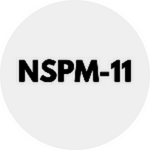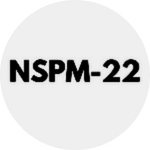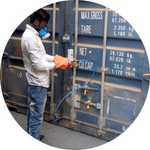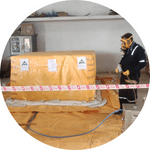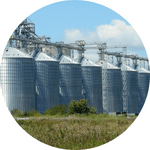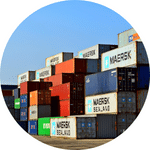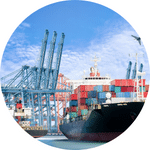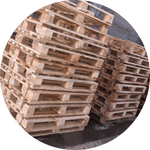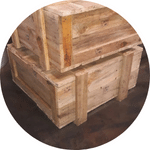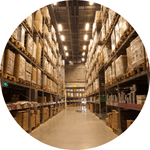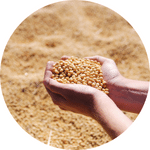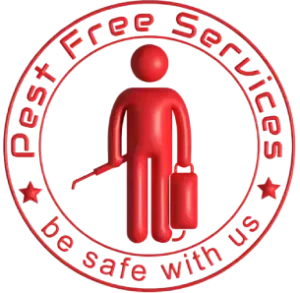
Fumigation Services & Certificate For Export Goods As Per ISPM-15
We are expert in providing quarantine fumigation service for export shipments and other purpose.
get your free quote now

Fumigation Services Accordance With The ISPM-15, NSPM-22 & NSPM-12 Norms Of Directorate Of Plant Protection, Quarantine & Storage, Government Of India.
Fumigation is an approved treatment by the Directorate of Plant Protection Quarantine & Storage, Ministry of Agriculture, Government of India used for controlling pests and disease infestations in agricultural commodities, empty containers, foodstuff, Timber, and other wooden packing materials, including dunnage, wooden pallets & boxes, in many countries around the world require all the goods are export/import from one country to another country to be treated before shipment as per the ISPM-15 standard in order to satisfy their own quarantine requirements.
Pest Free Services is a fumigation company accredited by the Directorate of Plant Protection Quarantine and Storage, Ministry of Agriculture, Government of India, as per NSPM-12 & NSPM-22 which has carried out fumigation of cargo (stack/container/pallets/agriculture commodities) in PAN India as per the respective overseas international quarantine requirements. This fumigation company has also given special emphasis and attention to carrying out fumigation services as per ISPM-15, NSPM-12 & NSPM-22 standards.
Note: We provide fumigation certificate online & offline, which means soft copy and hardcopy.
Pest Free Services holds government-authorized licenses:
1. Fumigation License Number Is IN – 723/MB(Approved For Australian Fumigation Certificate)
2. Fumigation License Number Is IN – 902/MB
Fumigation Services And Certifications
1. Methyl Bromide(MBR) Fumigation Service
Methyl bromide fumigation is a method of pest control used in a variety of settings, including agriculture, food storage, and shipping. It involves the use of a highly toxic gas, methyl bromide, to eliminate pests such as insects, rodents, and fungi.
Methyl bromide is a colorless gas that is highly effective in controlling a wide range of pests. However, it is also highly toxic to humans and animals and can cause serious health effects if not handled properly. For this reason, the use of methyl bromide has been restricted in many countries, and alternative pest control methods have been developed.
The fumigation process typically involves sealing a structure or container and releasing methyl bromide gas into the enclosed space. The gas penetrates all areas of the structure or container, including cracks and crevices, to reach the pests. The length of the fumigation process depends on the type of pest being targeted and the size of the space being fumigated.
After the fumigation process is complete, the structure or container must be ventilated to remove the methyl bromide gas before it can be safely occupied or the treated goods can be used. This ventilation process is critical to ensure that no harmful levels of the gas remain.
Methyl bromide fumigation can be an effective pest control method when used properly and in accordance with applicable regulations and guidelines. However, it is important to consider the potential health and environmental risks associated with the use of this highly toxic gas. Alternative pest control methods, such as heat treatment, pheromone traps, and biological control, may be safer and more sustainable options in many situations.
If you are considering methyl bromide fumigation as a pest control option, it is important to consult with a licensed professional who is trained in the proper use and handling of this gas. They can provide guidance on whether this method is appropriate for your specific situation and ensure that all necessary precautions are taken to protect human health and the environment.
2. Aluminium Phosphide(ALP) Fumigation Service
Aluminium phosphide fumigation is a pest control method that is commonly used in agriculture and food storage facilities. It involves the use of aluminium phosphide, a highly toxic gas, to eliminate pests such as insects, and rodents.
Aluminium phosphide is a greyish-white powder that reacts with moisture in the air to release phosphine gas. Phosphine gas is highly toxic to pests and can penetrate all areas of a structure or container, including cracks and crevices. However, it can also be toxic to humans and animals if not handled properly.
The fumigation process typically involves sealing the structure or container to be treated and releasing the aluminium phosphide tablets or pellets into the enclosed space. The gas is then allowed to penetrate the area for a specific period of time, usually between 24 and 72 hours depending on the pest being targeted and the size of the space being fumigated.
After the fumigation process is complete, the structure or container must be ventilated to remove any residual gas before it can be safely occupied or the treated goods can be used. This ventilation process is critical to ensure that no harmful levels of gas remain.
Aluminium phosphide fumigation can be an effective pest control method when used properly and in accordance with applicable regulations and guidelines. However, it is important to consider the potential health and environmental risks associated with the use of this highly toxic gas. Alternative pest control methods, such as heat treatment, pheromone traps, and biological control, may be safer and more sustainable options in many situations.
If you are considering aluminium phosphide fumigation as a pest control option, it is important to consult with a licensed professional who is trained in the proper use and handling of this gas. They can provide guidance on whether this method is appropriate for your specific situation and ensure that all necessary precautions are taken to protect human health and the environment.
3. Fumigation Certificate For Export
A fumigation certificate is an official document that verifies that a specific item or shipment has been treated with a fumigant to eliminate pests or organisms that could potentially harm agriculture, forestry, or other industries. This certificate is issued by a licensed and authorized fumigation service provider or company, and it confirms that the fumigation process has been completed according to the local regulations and standards.
Fumigation certificates are typically required for the international transport of goods, particularly for agricultural products and raw materials. They may also be required for domestic shipments or for goods that are stored or transferred between different states or regions within a country.
The fumigation certificate contains information about the type of fumigant used, the dosage, the duration of the treatment, and the location and date of the fumigation. It also includes the name and contact information of the fumigation service provider, as well as the signature and stamp of an authorized inspector or government official.
It is important to note that the requirements for fumigation certificates may vary depending on the country or region of origin and destination, as well as the type of goods being shipped. Therefore, it is crucial to verify the specific regulations and requirements for each shipment to ensure compliance and avoid any potential delays or penalties.
Standards & Types of Fumigation Services


Why Export Fumigation Service Is Required For Export & Import Goods?
Export fumigation services are required for both export and import goods mainly for regulatory compliance as per ISPM-15, NSPM-12, and NSPM-22. These services ensure that exported goods like wooden packing, and agriculture commodities comply with the phytosanitary regulations of importing countries, which aim to prevent the spread of pests, and diseases. By fumigating goods before export, pests such as weevils and beetles are eliminated, reducing the risk of introducing harmful organisms into foreign ecosystems. Additionally, fumigation helps maintain the quality and integrity of goods during transit, especially for perishable items such as food products and grains. Without proper fumigation, goods may face rejection or quarantine at the destination port, causing delays and financial losses to exporters. Therefore, export fumigation services are important to facilitate smooth international trade, ensure compliance with regulations(SPM-15, NSPM-12, and NSPM-22), and protect the safety and quality of goods.
Validation Period of Fumigation & Fumigation Certificate
Fumigation has been conducted in accordance with the ISPM-15, NSPM-22, and NSPM-12 norms set by the Directorate of Plant Protection, Quarantine, and Storage, Government of India. The fumigation treatment does not provide a residual effect to prevent re-infestation by common insects after 21 days. Therefore, we cannot offer any guarantee against re-infestation beyond this period. No liability is assumed by the certifying company, its proprietor, or its representative regarding this certificate. Please note that if the shipment has not been shipped within 21 days, a re-fumigation will be necessary, and the previously issued certificate will be invalid.
On Which Ports Do We Provide Fumigation Service?
- Nhava Sheva
- Mundra Port
- ICD Dadri
- Chennai Seaport
- Surat Port
- ICD Modinagar
- ICD Tughlabad, New Delhi
- IGI Airport New Delhi
- ICD, Jattipur Sonepat
- JNPT Mumbai
- Kandla Port
- CPL Dadri

